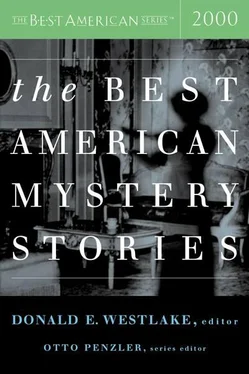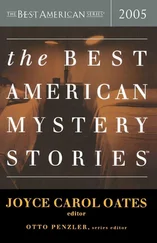“All right,” I said, though my heart sank when she said it, for I wanted her to care about me in some way, but I don’t think that was something she knew how to do. I fixed her a makeshift bed on the sofa in the den where I finally convinced her to sleep. As long as I kept my distance and made no sudden moves toward her and did not ever raise my voice above the gentle words you would use with a baby, we were all right. But it was not a way any man could live for long and I wondered what I could do — send her back to Sebastian’s place, where she was but chattel? I feared one day she would wander into the woods and go wild. I might have called the county, said, Look, this child, who has wandered here from my uncle’s house, is in need of attention and there is nothing more I can do.
Who would take in such a child but the mental hospital up in Tuscaloosa?
I figured Sebastian thought she’d been sucked up into the twister and scattered into blood and dust, until the afternoon I heard his pickup muttering and coughing along the dam and then his springs sighing as he idled down the steep drive to the house, and then the creaking door and I was out on the porch waiting on him. He stopped at the steps and nodded and looked off across the lake as if we were lost together in thought. Uncle Sebastian was old and small and thin and hard as iron and he had the impish and shrewd face of all his siblings. His face was narrow and his eves slanted down and in and his chin jutted up so that if you viewed him in profile his head was the blade of a scythe and his body the handle. He blinked in the sun and said, “We been most of the summer fixing up the house after that tornado back in the spring.”
I said, “Anybody hurt?”
“Well, we thought we’d lost little Maeve.” And he turns to me. “Then I hear tell she’s showed up over here, staying with you.”
“Where would you hear that?” I said, and he said nothing but I saw his eyes shift just a fraction up toward the ridge where the crazy woman’s house is perched.
The strays had shown little interest in Sebastian’s arrival and kept mainly to their little scooped-out cool spots under the bushes, a flea-drowsing shade. Hardly moved all August; through the long hot days all you’d hear was the occasional creaking yawn, wet gnashing of grooming teeth, isolated flappity racket of a wet dog shaking out his coat. Hardly any barking at all. We heard a rustling and Maeve stood at the edge of the yard in her headphones, a scruffy little longhaired stray at her heels.
“She was with child,” Sebastian said.
“She lost it.”
“That late?” he said and looked at me a long moment, then back at Maeve. “You keeping her outdoors and living with dogs?”
“If it was true, it would not be so different from what she came from,” I said.
“Go to hell,” Sebastian said. “Living out here by yourself, you going to tell me you ain’t been trying some of that?”
“That’s right.”
“Them boys of mine done all wandered off now she’s gone. I ain’t got no help.”
He walked slowly toward Maeve, who was standing there with two fingers of one hand pressed to the speaker over her right ear, head cocked, eyes cut left looking out at the lake. The little stray slinked back into the brush. Only when Sebastian laid his hand on Maeve’s arm did she lean away, her bare feet planted the way an animal that does not want to be moved will do. He began to drag her and she struggled, making not a sound, still just listening.
I walked up behind Sebastian and said his name, and when he turned I hit him between the eyes with the point of my knuckle. Small and old as he was, he crumpled. Maeve did not run then but walked over to the porch, up the steps, and into the house.
I dragged the old man by his armpits to the water, and waded out with him trailing. Maeve came out again and followed in her nightslip to the bank, and stood there eating a cherry popsicle. She took the popsicle out of her mouth and held it like a little beacon beside her head. Her lips were red and swollen-looking. She took the blue headphones off her ears and let them rest around her neck. I could hear the tinny sound of something in there, now it wasn’t inside of her head.
“What you doing with that man?” she said.
“Nothing,” I said.
“Are you drownden him?”
I said the first thing that came to mind.
“I am baptizing,” I said. “I am cleansing his heart.”
It was late afternoon then. I looked back over my shoulder at Maeve. She was half lit by sunlight sifting through the leaves, half in shadow. A mostly naked child in rotten garment.
Underwater, Uncle Sebastian jerked and his eyes came open. I held him harder and waded out to where it was up to my shoulders and the current strong toward the spillway, my heart heavy in the water, the pressure there pressing on it. Behind me. Maeve waded into the shallows.
“I want it too, Uncle,” she called.
Sebastian’s arms ceased thrashing, and after a minute I let him go. I saw him turning away in the water. Palms of his hands, a glimpse of an eye, the ragged toe of a boot dimpling the surface, all in a slow drifting toward the spillway, and then gone in the murk. Maeve lifted the gauzy nightslip up over her head as she waded in, her pale middle soft and mapped with squiggly brown stretch marks. I pushed against the current trying to reach her before she got in too deep. There was such unspeakable love in me. I was as vile as my uncle, as vile as he claimed.
“Hold still, wait there,” I said at the very moment her head went under as if she’d been yanked from below.
The bottom is slippery, there are uncounted little sinkholes. Out of her surprised little hand, the nightslip floated a ways and sank. I dove down but the water slowed me and I could not reach her. My eyes were open but the water was so muddy I could barely even see my own hands. I kept gasping up and diving down, the sun was sinking into the trees.
She would not show again until dusk, when from the bank I saw her ghost rise from the water and walk into the woods.
The strays tuned up. There was a ringing from the telephone inside the house. It would ring and stop a while. Ring and then stop. The sheriff’s car rolled its silent flickering way through the trees. Its lights put a flame in all the whispering leaves. There was a hollow taunting shout from up on the ridge but I paid it no mind.
I once heard at dawn the strangest bird, unnatural, like sweet notes sung through an outdoor PA system, some bullhorn perched in a tree in the woods, and I went outside.
It was coming from cast of the house, where the tornado would come through. I walked down a trail, looking up. It got louder. I got to where it had to be, it was all around me in the air, but there was nothing in the trees. A pocket of air had picked up a signal, the way a tooth filling will pick up a radio station.
It rang in my blood, it and me the only living things in that patch of woods, all the creatures fled or dug in deep, and I remember that I felt a strange happiness.
Raised in northern Michigan, author Doug Allynserved in Southeast Asia in military intelligence during the Vietnam War, later studied criminal psychology at the University of Michigan, then somehow parlayed those credentials into a twenty-year career in rock music before becoming an author.
From the beginning, critical response to his work has been remarkable. After winning the Robert L. Fish Memorial Award for best first short story, he has won or been nominated for every major award in the mystery field, including the ultimate prize, the Edgar Allan Foe Award.
• “Miracles! Happen!” features R. B. Axton, a composite character based on a number of amiable thugs I met on the fringes of the music business. The moral is straightforward. If you’ve lived at all, you are scarred. Some marks are visible. But for good or ill, the deepest cuts don’t show.
Читать дальше












